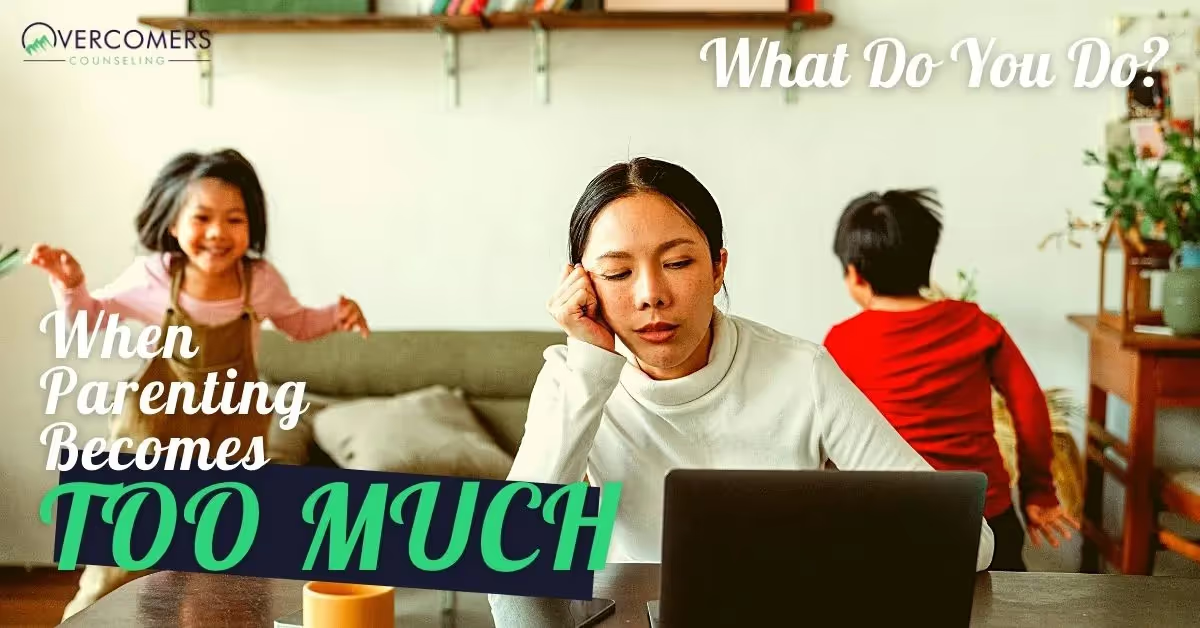Are you wondering how to cope when parenting becomes too much? Or Maybe, you are already feeling the strain of parenting in your personal and professional...

Are you wondering how to cope when parenting becomes too much? Or maybe, you are already feeling the strain of parenting in your personal and professional life and wondering how you can improve this situation. Either way, you are in the right place, as this post explores the impact the parenting responsibilities can have on your life.
Having a newborn is an over joyous experience, whether you are a couple or a single parent. However, as time goes by, you start to feel the pressure. This can lead to physical fatigue, mental health issues, and emotional distress.
If you feel the strenuous effects of being a parent and find yourself complaining about it ??? do not feel guilty because you are not alone. All parents feel the full blow of parenthood at some point in their life.
Research shows that although parents do not like to admit, they feel overwhelmed with the strain, stress, and negative impact of parenting on their health and well-being.
Most people believe small children small problems, bigger children bigger problems. However, this is not the case when it comes to parenting. Now, mothers are coming forward, speaking openly about postpartum depression and feeling the stresses of becoming a new parent.
The point is, you can feel the strain of parenthood at any stage of your child's life, right from being a toddler to their teenage years. With young babies, you have to constantly take care of their needs, i.e., to feed them every couple of hours, working your way around their sleeping patterns, feeding, and pooping times. There are days on end when you find yourself deprived of sleep or when you are on the verge of crying out of physical exertion.

It becomes even more stressful with growing children as now you have to run after them, make sure they are safe, feed them, and deal with their emotional tantrums and behavioral issues. Did you know that studies show that parental burnout can manifest in harmful outcomes for you as a parent?
As you wrestle your way through each day's duties as a parent, it may cause fatigue leading to increased irritability and frustration in your behavior. Sometimes, this shows in your response towards your children and may hinder their confidence and sensitivity too.
Although you are physically knackered, psychological stress and mental exhaustion take the most tolls. When parenting becomes too much, you must take care of your physical and psychological well-being. This is essential for the sake of your sanity and to nurture your children in a much positive manner.
Here are six different strategies that can help you in times when parenting becomes too much.
Parents often get overwhelmed by the number of tasks at hand, leading to anxiety and panic attacks. Therefore, you must prioritize the parenting responsibilities by splitting them into smaller, more manageable tasks.
If you are finding it hard to cope with a parent's responsibilities, do not be shy to ask for help - nobody is going to judge you. After all, we are all humans and have our limits.
Why not speak to your partner, ask for parents to give you a helping hand, or speak to a mental health professional or therapist to help you cope with the stress you are feeling.
Yes, you are a dedicated parent and want to be there for your kids all the time. However, neglecting your own needs will result in negative effects on your physical as well as emotional and psychological well-being.
Allow yourself to find something you love doing. If you feel shy to talk about how you feel, why not jot it down in a private journal. Remember, catharsis is the goal here, and studies prove that writing about stress can improve your health.
Why not find a hobby or activity outside your parenting lifestyle or duties? You can become a part of a book-club, volunteer in events you may enjoy organizing and attending, etc. Find anything you like doing; the idea is to break-free from your daily routine and do something you enjoy.
Where did the friends go? It would help if you got back in your circle. Of course, you may not fancy being the social butterfly you once were. But catching up with friends can make you feel like yourself.

Colorado Springs is a beautiful city by day and a magical time at night. There are plenty of potential date nights in the second largest city of the state.
https://www.uncovercolorado.com/best-colorado-springs-date-ideas/
Connecting with other parents can help you overcome your struggles. You can compare notes with parents with kids in a similar age-group to yours. You will be surprised at how common it is when parenting becomes too much for every parent.
This will definitely give you the psychological and emotional assurance that you are not a bad parent. Thus, it will help in normalizing your anxiety, depression. Eventually, that guilt of complaining will fade away, and you will feel the burden lifted off your shoulders.
Whether you are a couple or a single parent, you deserve a break. As a couple, ask your parents to lend you a helping hand or hire a babysitter while you can go out and have a date night at least twice a month. As a single parent, you can plan a night out with your friends or colleagues and let your hair down.
If you have grown-up kids, why not plan a family getaway or vacation. It will do well for all of you to ditch family life's mundane routine and breathe in some freshness.
Not only for yourself, but such activities can do wonders for your relationship with your partner. Moreover, you can use this opportunity to bond with each other in a more relaxed environment.
In the end, it is all about finding the right balance between your parenting responsibilities and personal well-being. So, when parenting becomes too much, you must do whatever it takes to avoid exerting yourself day-in and day-out.
Remember, all those efforts, demanding coordination and planning of your children's lives along with handling your personal relationship and life, can kick up the mental and physical pressure. Next thing you know, all sorts of physiological, emotional, and psychological issues start manifesting themselves.
Also, remember, it is ok to prioritize yourself too! You just need to find your personal stress relievers to strike the right balance between your parental responsibilities and your psychological well-being.
You can teach your child persistence by modeling the behavior yourself, encouraging them to take risks, setting goals and tracking progress, praising effort, and providing support and guidance.